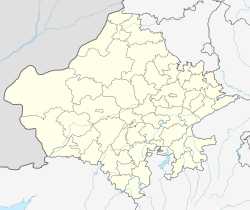Derasar, Rajasthan
Derasar | |
|---|---|
| Coordinates: 25°47′59″N 71°09′53″E / 25.79972°N 71.16472°E | |
| Country | India |
| State | Rajasthan |
| Division | Jodhpur division |
| District | Barmer |
| Tehsil | Ramsar |
| Population | |
| • Total | c. 600[1] |
| Language | |
| • Official | Hindi |
| Time zone | UTC+5:30 (IST) |
Derasar is a village in the Barmer district of Rajasthan, near the border of India and Pakistan.[2] Derasar lies within the Thar Desert, which influences the lives of the residents; taankas are used to collect water and husbands have two wives, one of whom devotes herself to collecting water from a nearby water source five kilometres away from the village.[3] The culture of Derasar reflects that of the region of Rajputana within the Indian subcontinent, such as the wearing of the angarkha.[4]
Demographics and geography
[edit]The population of Derasar consists about 600 persons, including 70 Muslim families.[1]
Derasar lies within the arid Thar Desert and for eleven months of the year, water is scarce.[3] As such, rainwater is collected in taankas which "have a catchment area to collect rainwater which is then stored underground".[3] The nearest water source to the village is five kilometers away, requiring residents to walk at lengths to retrieve it.[5][3] In recent times, men have had to find work in larger cities leaving the women to tend to the crops.[3] The International Crops Research Institute for the Semi-Arid Tropics has provided fruit trees to Derasar, in addition to knowledge on which crops would be successful in the dry region.[3] Crops that are grown in Derasar include "pearl millet, cluster bean, green gram, moth bean, sesame and watermelons".[3]
Derasar has communal grazing pastures that provide nutrition for the residents' livestock.[3]
Culture
[edit]The culture of Derasar is centered around the historic customs of the South Asian region of Rajputana.[4] Men wear a tradition Indian garment known as an angarkha, along with scarves and jewellery.[4]
With respect to marriage customs, teenagers do not date but have their marriages arranged or alternatively, choose celibacy.[4]
Unique to the culture of Derasar is the practice of polygamy, in which it is normative for men to have two wives.[4] The husband's first child is usually from the first wife, with the second wife bearing a child later.[4] The reason for this custom is said to be practical: with the nearest water source being five kilometres away, the first wife is tasked with fetching water as Derasar locals believe that it would be quite difficult for a pregnant woman to accomplish this.[5]
References
[edit]- ^ a b "Men in this Rajasthan village marry twice for a strange reason". India Today. 20 July 2016. Retrieved 4 February 2022.
- ^ "Men in this Rajasthan village marry twice for a strange reason". India Today. 20 July 2016. Retrieved 4 February 2022.
Close to the Indo-Pak border in Rajashtan's Barmer district is Derasar village.
- ^ a b c d e f g h "Women lead the way out of poverty in an Indian desert". Al Jazeera. 19 November 2015. Retrieved 4 February 2022.
- ^ a b c d e f Chakraborty, Sneha (22 September 2021). "We Spoke to Men Who Escaped a Cult That Forced Them to Have Multiple Wives". Vice News. Retrieved 4 February 2022.
- ^ a b "Men in this Rajasthan village marry twice, and the reason will bemuse you". The Free Press Journal. 29 May 2019. Retrieved 4 February 2022.


